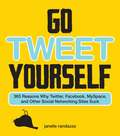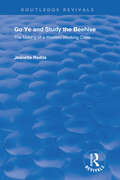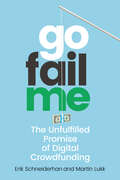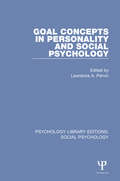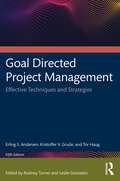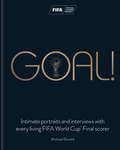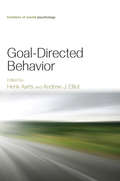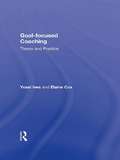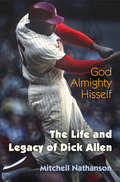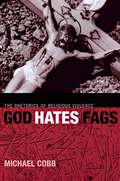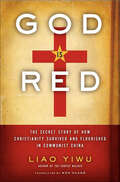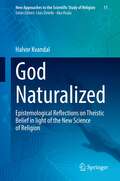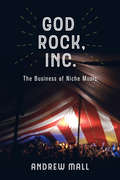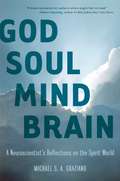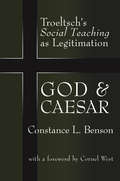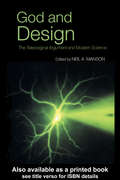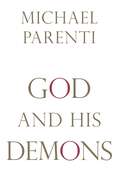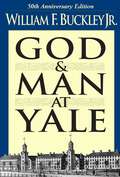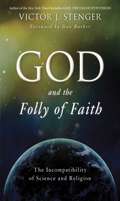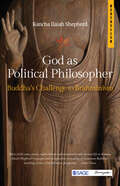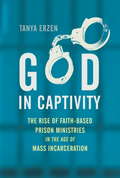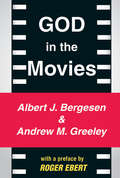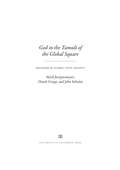- Table View
- List View
Go Beyond the Job Description: A Step-by-Step Guide to Optimizing Talents, Skills, and Strengths in Organizations
by Ashley PrisantWhat strengths are your employees leaving untapped, and how can you change that? Go Beyond the Job Description introduces the Talent Engagement Optimization (TEO) framework, a 100-day plan that helps HR professionals and managers leverage the skills and capabilities employees already have but don't fully use at work. With step-by-step guidance, the book shows how to increase motivation, productivity and engagement by aligning individual talent with meaningful organizational goals. It features an online assessment to identify your Talent Engagement Zone, plus practical tools like development plans, transition guides and resource kits to ensure long-term success.This is an ideal resource for time-pressed HR managers seeking to do more with what they already have - people included.
Go Tweet Yourself: 365 Reasons Why Twitter, Facebook, MySpace, and Other Social Networking Sites Suck
by Janelle RandazzaFlip Twitter the bird.Tell Facebook to f#@% off.Lose it on LinkedIn.Somewhere between the advent of Facebook and launching Twitter to the masses, the Internet betrayed us. It allowed pages to be viewed by job interviewers, newsfeeds to be flooded by Aunt Julie, and for constant tweets about what color socks that random girl from the study group is going to wear today.This book is the hilarious reply all that says: enough is enough. We don’t want to see the pictures from your business trip to Omaha. We don’t want a page-by-page account of what’s going on in Twilight. We definitely don’t want a virtual drink!When you can’t fix the problem, fix the blame. And since there’s no way in 2.0-hell that you can put an end to the bastardization of the Book, you may as well have a good laugh while pointing the finger at those who ruined their online experience.
Go Ye and Study the Beehive: The Making of a Western Working Class
by Jeannette RoddaFirst published in 2000. More than any other occupation, the long history of mining raises issues of class and dependency, of men, women, and children bound to permanent wage work or forced labor underground with small hope of securing an independent living. Like all popular images, perceptions of workers reveal as much about the nature of the dominant culture as about the complex experiences of workers themselves. The main purpose of this study is to document and analyze the development of working-class culture in the mining camps of the American West.
GoFailMe: The Unfulfilled Promise of Digital Crowdfunding
by Erik Schneiderhan Martin LukkThe gaping holes in the U.S. and Canadian social safety nets mean that many people live in a state of financial precarity that can instantly become untenable in the face of another big expense, such as a large medical bill or damaged property. Historically, people have turned to their communities, neighbors, families, and loved ones for help in these situations. Today, asking for money on the internet through crowdfunding is among the most popular ways of seeking and donating to charity, and for-profit enterprises have realized that tapping into this instinct for helping is extremely good business. GoFailMe reveals how these sites, most notably GoFundMe, enjoy massive revenue, without providing the help they promise. They fail most of their users while putting them through an emotional rollercoaster and using sneaky tactics to obscure that reality. With unprecedented access to interviews, surveys, and hundreds of thousands of crowdfunding cases across North America, Erik Schneiderhan and Martin Lukk take on pressing questions with critical insight: When do we turn to others for help? Who succeeds and who fails in the digital crowd? Whom do these sites benefit? Ultimately, the failure of GoFundMe and others is emblematic of the inability of the for-profit sector and Big Tech to engineer an end to social inequality.
Goal Concepts in Personality and Social Psychology (Psychology Library Editions: Social Psychology)
by Lawrence A. PervinIs behavior motivated? And if so, can it be motivated by the anticipation of future events? What role does cognition play in such motivational processes? And, further, what role does motivation play in ongoing cognitive activity? Questions such as these provide the foundation for this book, originally published in 1989. More specifically, the chapters in this book address the question of the utility of goals concepts in studying motivation and social cognition.
Goal Directed Project Management: Effective Techniques and Strategies
by Erling S. Andersen Kristoffer V. Grude Tor HaugGoal Directed Project Management (GDPM) is a method developed by the authors, based on practical experience. It has been refined over 40 years and is still widespread in curricula in universities/colleges and adopted as a standard approach by organisations all over the world.The book is different from other textbooks in project management as it is a focused approach on how to do it, rather than a general discussion. The book emphasises PSO (People, System, and Organisational development), the need to develop People (training and motivation) and Organisation in conjunction with Systems/technical development if you want desired results. The book presents detailed and practical guidance on how to plan, organise, and control PSO projects through hierarchical planning with practical methods and tools (milestone and activity planning and responsibility charts). Uncertainty and multi‑project management are also covered.New in this edition is benefit realisation. Most of the work on benefit realisation takes place after a project has been delivered, but a lot can be implemented within the framework of the project. Research shows that the greatest degree of project success is achieved when there is a close relationship between benefit realisation and project management, and between project owner and project manager.
Goal!: Intimate portraits and interviews with every living FIFA World Cup Final scorer
by Michael DonaldBeautifully illustrated and officially licensed by FIFA, Goal! is a unique football book that captures the essence of the ultimate sporting achievement.This is a fascinating portrait of the men who have lived the dream of every football fan worldwide. Includes: Intimate portraits by award-winning photographer Michael DonaldInterviews with the players, giving fascinating insight into the occassion, from the music they played on the bus to the stadium, to the meal they ate afterwardsProfiles on Pelé, Ronaldo, Zidane, Götze annd many more of the greatsThe book includes the story of what happened in each FIFA World Cup?, what happened to the players afterwards and what they do today. There's also a comprehensive statistics section covering all the facts and figures for each World Cup tournament so readers can relive the matches they saw, and discover the details about the ones they didn't.
Goal-Directed Behavior (Frontiers of Social Psychology)
by Andrew J. Elliot Henk AartsThis volume presents chapters from internationally renowned scholars in the area of goals and social behavior. The book is organized around a series of topics that are of critical importance to understanding the social-cognitive aspects of goal-directed behavior. In each chapter, the authors offer an introduction to past research on a specific topic and combine this with a presentation of their own empirical work to provide an integrated overview of the topic at hand. As a whole, this volume is designed to provide a broad portrait of goal research as it has been and is currently being conducted in the social psychological literature. It serves as an introduction to essential issues, while at the same time offering a sampling of cutting-edge research on core topics in the study of goal-directed behavior, such as how goals are represented, where goals come from, and what goals do in the process of regulation.
Goal-focused Coaching: Theory and Practice
by Elaine Cox Yossi IvesThis book offers a comprehensive, practical guide to goal-focused coaching. Addressing a significant gap in the literature, Ives and Cox contextualize goal-focused coaching within the broader coaching framework and explain the efficacy of this approach across a number of contexts and applications. The book draws on behavioral science, rather than humanistic psychology, to provide a well-researched, evidence-based guide that includes: A detailed examination of the theoretical underpinnings of this approach A discussion of the skills, models and formats for goal-focused coaching Cutting edge insights into barriers to coaching and managing the coaching relationship Summaries, vignettes, references, and diagrams to aid learning Goal-focused Coaching will be of interest to students taking classes in coaching, as well as professional executive coaches.
God Almighty Hisself
by Mitchell NathansonWhen the Philadelphia Phillies signed Dick Allen in 1960, fans of the franchise envisioned bearing witness to feats never before accomplished by a Phillies player. A half-century later, they're still trying to make sense of what they saw. Carrying to the plate baseball's heaviest and loudest bat as well as the burden of being the club's first African American superstar, Allen found both hits and controversy with ease and regularity as he established himself as the premier individualist in a game that prided itself on conformity. As one of his managers observed, "I believe God Almighty hisself would have trouble handling Richie Allen. " A brutal pregame fight with teammate Frank Thomas, a dogged determination to be compensated on par with the game's elite, an insistence on living life on his own terms and not management's: what did it all mean? Journalists and fans alike took sides with ferocity, and they take sides still. Despite talent that earned him Rookie of the Year and MVP honors as well as a reputation as one of his era's most feared power hitters, many remember Allen as one of the game's most destructive and divisive forces, while supporters insist that he is the best player not in the Hall of Fame. God Almighty Hisself: The Life and Legacy of Dick Allen explains why. Mitchell Nathanson presents Allen's life against the backdrop of organized baseball's continuing desegregation process. Drawing out the larger generational and business shifts in the game, he shows how Allen's career exposed not only the racial double standard that had become entrenched in the wake of the game's integration a generation earlier but also the forces that were bent on preserving the status quo. In the process, God Almighty Hisself unveils the strange and maddening career of a man who somehow managed to fulfill and frustrate expectations all at once.
God Has a Dream: A Vision of Hope for Our Time
by Desmond Tutu Douglas AbramsDesmond tutu is known the world over for freeing South Africa of Apartheid. He fought along with other South Africans to make their country a leader in the Civil Rights Movement of the late 1980's and into the new century. Tutu was awarded the Nobel Peace Prize for his works. In this short but powerful book, Tutu, who is also a prominent minister, tells of God's plan for everyone, and discusses God's love. He discusses how we should never lose hope and how we should treat the entire world as our family. He shows this love and world peace with many examples from his work in South Africa and his travels around the world.
God Hates Fags: The Rhetorics of Religious Violence (Sexual Cultures #20)
by Michael Cobb2007 Choice Outstanding Academic TitleAt the funeral of Matthew Shepard—the young Wyoming man brutally murdered for being gay—the Reverend Fred Phelps led his parishioners in protest, displaying signs with slogans like “Matt Shepard rots in Hell,” “Fags Die God Laughs,” and “God Hates Fags.” In counter-protest, activists launched an “angel action,” dressing in angel costumes, with seven-foot high wings, and creating a visible barrier so one would not have to see the hateful signs.Though long thought of as one of the most virulently anti-gay genres of contemporary American politics and culture, in God Hates Fags, Michael Cobb maintains that religious discourses have curiously figured as the most potent and pervasive forms of queer expression and activism throughout the twentieth century. Cobb focuses on how queers have assumed religious rhetoric strategically to respond to the violence done against them, alternating close readings of writings by James Baldwin, Tennessee Williams, Jean Toomer, Dorothy Allison, and Stephen Crane with critical legal and political analyses of Supreme Court Cases and anti-gay legislation. He also pays deep attention to the political strategies, public declarations, websites, interviews, and other media made by key religious right organizations that have mounted the most successful regulations and condemnations of homosexuality.
God Is Red: The Secret Story of How Christianity Survived and Flourished in Communist China
by Liao Yiwu“A journalistic chronicle of how Christians survived the repressive Mao era as well as a glimpse into why their numbers are rising.” —The Christian Science MonitorA Books & Culture Best Book of the YearWhen journalist Liao Yiwu first stumbled upon a vibrant Christian community in officially atheistic China, he knew little about Christianity. In fact, he’d been taught that religion was evil, and that those who believed in it were deluded, cultists, or imperialist spies. But as a writer whose work had been banned in China and even landed him in jail, Liao felt a kinship with Chinese Christians in their unwavering commitment to freedom of expression and to finding meaning in a tumultuous society.In God is Red, this Chinese dissident and celebrated author of The Corpse Walker profiles the extraordinary lives of dozens of Chinese Christians—among them a nun, a surgeon, a minister, and a blind musician—providing a rare glimpse into the underground world of belief that is taking hold in the post-Mao era within the officially atheistic state of Communist China, a community that has inspired him deeply even though he is not a Christian himself. This is a fascinating tale of otherwise unknown personalities thriving against all odds.“Restores an important part of Chinese history that has been distorted, erased, or forgotten, and documents the life stories of a special group of people who battle against suppression to preserve their faiths.” —Liu Xiaobo, winner of the Nobel Peace Prize
God Naturalized: Epistemological Reflections on Theistic Belief in light of the New Science of Religion (New Approaches to the Scientific Study of Religion #11)
by Halvor KvandalThis volume argues that theistic philosophy should be seen not as an “armchair” enterprise but rather as a critical endeavor to bring philosophy of religion into close contact with emerging sciences of religion. This text engages with the rationality of religious belief by investigating central problems and arguments in philosophy of religion from the perspective of new naturalistic research. A central question the book analyzes is whether findings in cognitive science of religion (CSR) falsify or undermine religious ideas and beliefs. With regard to CSR, this volume offers a sustained and critical investigation of the neutrality and positive-relevance view, before offering a re-appraisal of the conflict view. The text argues that when scrutinizing these views, much more attention must be paid to specific normative premises that allow empirical findings to have epistemic relevance. A novel feature is the theoretical application of analytical epistemology in virtue-epistemology to the central question of whether CSR undermines, supports, or is neutral with respect to religious belief. This book appeals to upper-level students and researchers in the field.
God Rock, Inc.: The Business of Niche Music
by Andrew MallPopular music in the twenty-first century is increasingly divided into niche markets. How do fans, musicians, and music industry executives define their markets’ boundaries? What happens when musicians cross those boundaries? What can Christian music teach us about commercial popular music? In God Rock, Inc., Andrew Mall considers the aesthetic, commercial, ethical, and social boundaries of Christian popular music, from the late 1960s, when it emerged, through the 2010s. Drawing on ethnographic research, historical archives, interviews with music industry executives, and critical analyses of recordings, concerts, and music festival performances, Mall explores the tensions that have shaped this evolving market and frames broader questions about commerce, ethics, resistance, and crossover in music that defines itself as outside the mainstream.
God Soul Mind Brain
by Michael S. Graziano"Essential reading for the devout, the agnostic, and the atheist. In tackling the question of the religious brain, Graziano is respectful, sincere, and scientifically plausible. This might even be an Important Book."-Sam Wang, author of Welcome to Your Brain"A beautifully crafted, tightly scripted account of how the far-flung legions of the brain's neurons give rise to social awareness and our notions of soul, religion and God."-Christof Koch, author of The Quest for Consciousness"Lucid and engaging. . . . Moves with pace and humor."-Philip Johnson-Laird, author of Mental Models"Do we know the origins of Gods and ghosts? This well-written book makes the bold case that new discoveries in social neuroscience can illuminate human spiritual experience."-Terry Sejnowski, PhD, Salk Institute/UC San DiegoWriting for the general public, Michael S. A. Graziano explores the controversial relationship between science and religion, first dismissing the "science versus religion" debate as outdated. The cutting-edge field of social neuroscience explains how our perceptions of our own consciousness, of other minds, and of spirits and gods depend on machinery in the brain that evolved to make us socially intelligent animals. In clear prose without technical jargon, Graziano discusses his and others' findings in this twenty-year-old science and the implications for human spirituality and religion.Michael S. A. Graziano, professor of neuroscience, Princeton University, is the author of numerous articles on the functioning of the brain. He is internationally known for fundamental discoveries about sensory-motor coordination. His previous book on the brain, The Intelligent Movement Machine, was published by Oxford University Press in 2008.
God and Caesar: Troeltsch's Social Teaching as Legitimation
by Constance L. BensonH. Richard Niebuhr's powerful interpretation of Ernst Troeltsch has shaped our view of the man for over seventy years. Troeltsch is one of the most respected and renowned figures in liberal Protestant thought. Yet as Harvard philosopher of religion Cornel West observes in his foreword, Constance Benson "shat-ters certain crucial aspects of Troeltsch's image as a liberal religious thinker" with God and Caesar.Benson reconstructs the historical context in which Troeltsch wrote his landmark The Social Teaching of the Christian Churches, and reinterprets it in relation to that context. She shows that Troeltsch's Christian-ity legitimized class, religious, and gender inequality in response to the challenges of social democracy. Her controversial exploration of why most Troeltsch scholars have remained silent on this deserves seri-ous consideration. Her discovery of Troeltsch's rolein the politics and ideological debates of Imperial Germany require a painful reexamina-tion of an entire chapter of Protestant history. Benson exposes Troeltsch's relationship to Paul de Lagarde, a notorious anti-Semite and architect of what later became Nazi ideology.God and Caesaris a needed corrective. Troeltsch is an important figure for the Chris-tian right in Germany and for many mainstream Protestants in the United States. Benson's courageous book is the most challenging critique of Troeltsch's politics we have—an unsettling perspective that forces us to revise the beloved Troeltsch so many of us had come to admire and cherish. It will be of interest to intellectual historians, theologians and students of religious history, and specialists in German social and political history.
God and Design: The Teleological Argument and Modern Science
by Neil A. MansonRecent discoveries in physics, cosmology, and biochemistry have captured the public imagination and made the Design Argument - the theory that God created the world according to a specific plan - the object of renewed scientific and philosophical interest. This accessible but serious introduction to the design problem brings together new perspectives from prominent scientists and philosophers including Paul Davies, Richard Swinburne, Sir Martin Rees, Michael Behe, Elliot Sober and Peter van Inwagen.It probes the relationship between modern science and religious belief, considering their points of conflict and their many points of similarity. Is the real God of creationism the 'master clockmaker' who sets the world's mechanism on a perfectly enduring course, or a miraculous presence who continually intervenes in and alters the world we know? Are science and faith, or evolution and creation, really in conflict at all? Expanding the parameters of a lively and urgent debate, God and Design considers how perennial questions of origin continue to fascinate and disturb us.
God and His Demons
by Michael ParentiA noted author and activist brings his critical acumen and rhetorical skills to bear in this polemic against the dark side of religion. Unlike some popular works by stridently outspoken atheists, this is not a blanket condemnation of all believers. Rather the author's focus is the heartless exploitation of faithful followers by those in power, as well as sectarian intolerance, the violence against heretics and nonbelievers, and the reactionary political and economic collusion that has often prevailed between the upper echelons of church and state. Parenti notes the deleterious effects of past theocracies and the threat to our freedoms posed by present-day fundamentalists and theocratic reactionaries. He discusses how socially conscious and egalitarian minded liberal religionists have often been isolated and marginalized by their more conservative (and better financed) coreligionists. Finally, he documents the growing strength of secular freethinkers who are doing battle against the intolerant theocratic usurpers in public life. Historically anchored yet sharply focused on the contemporary scene, this eloquent indictment of religion's dangers will be welcomed by committed secular laypersons and progressive religionists alike.
God and Man at Yale: The Superstitions of 'Academic Freedom'
by William F. Buckley Jr."For God, for country, and for Yale... in that order," William F. Buckley Jr. wrote as the dedication of his monumental work—a compendium of knowledge that still resonates within the halls of the Ivy League university that tried to cover up its political and religious bias. In 1951, a twenty-five-year-old Yale graduate published his first book, which exposed the "extraordinarily irresponsible educational attitude" that prevailed at his alma mater. The book, God and Man at Yale, rocked the academic world and catapulted its young author, William F. Buckley Jr. into the public spotlight. Now, half a century later, read the extraordinary work that began the modern conservative movement. Buckley's harsh assessment of his alma mater divulged the reality behind the institution's wholly secular education, even within the religion department and divinity school. Unabashed, one former Yale student details the importance of Christianity and heralds the modern conservative movement in his preeminent tell-all, God and Man at Yale: The Superstitions of "Academic Freedom."
God and the Folly of Faith: The Incompatibility of Science and Religion
by Victor J. StengerA thorough and hard-hitting critique that is a must read for anyone interested in the interaction between religion and science. It has become the prevalent view among sociologists, historians, and some theistic scientists that religion and science have never been in serious conflict. Some even claim that Christianity was responsible for the development of science. In a sweeping historical survey that begins with ancient Greek science and proceeds through the Renaissance and Enlightenment to contemporary advances in physics and cosmology, Stenger makes a convincing case that not only is this conclusion false, but Christianity actually held back the progress of science for one thousand years. It is significant, he notes, that the scientific revolution of the seventeenth century occurred only after the revolts against established ecclesiastic authorities in the Renaissance and Reformation opened up new avenues of thought. The author goes on to detail how religion and science are fundamentally incompatible in several areas: the origin of the universe and its physical parameters, the origin of complexity, holism versus reductionism, the nature of mind and consciousness, and the source of morality. In the end, Stenger is most troubled by the negative influence that organized religion often exerts on politics and society. He points out antiscientific attitudes embedded in popular religion that are being used to suppress scientific results on issues of global importance, such as overpopulation and environmental degradation. When religion fosters disrespect for science, it threatens the generations of humanity that will follow ours.
God as Political Philosopher: Buddha’s Challenge to Brahminism
by Kancha Ilaiah ShepherdIn this provocative and scholarly book, Kancha Ilaiah Shepherd propounds a view of Gautama Buddha as India’s first social revolutionary. Buddha did his best to give the principles of tribal democracy and egalitarianism a sanctuary in his own sangha. In so doing, he foreshadowed modern India’s experiment with parliamentary democracy. Critical of the caste system, Buddha inducted low caste members into the sangha and made them his trusted advisers. He gave women an honoured place in the sangha. Dissent was indeed permitted, and even Buddha was not above the law. Pre-dating Socrates and Plato by some years, Buddha also foreshadowed key elements of their philosophy.
God in Captivity: The Rise of Faith-Based Prison Ministries in the Age of Mass Incarceration
by Tanya ErzenAn eye-opening account of how and why evangelical Christian ministries are flourishing in prisons across the United StatesIt is by now well known that the United States’ incarceration rate is the highest in the world. What is not broadly understood is how cash-strapped and overcrowded state and federal prisons are increasingly relying on religious organizations to provide educational and mental health services and to help maintain order. And these religious organizations are overwhelmingly run by nondenominational Protestant Christians who see prisoners as captive audiences.Some twenty thousand of these Evangelical Christian volunteers now run educational programs in over three hundred US prisons, jails, and detention centers. Prison seminary programs are flourishing in states as diverse as Texas and Tennessee, California and Illinois, and almost half of the federal prisons operate or are developing faith-based residential programs. Tanya Erzen gained inside access to many of these programs, spending time with prisoners, wardens, and members of faith-based ministries in six states, at both male and female penitentiaries, to better understand both the nature of these ministries and their effects. What she discovered raises questions about how these ministries and the people who live in prison grapple with the meaning of punishment and redemption, as well as what legal and ethical issues emerge when conservative Christians are the main and sometimes only outside forces in a prison system that no longer offers even the pretense of rehabilitation. Yet Erzen also shows how prison ministries make undeniably positive impacts on the lives of many prisoners: men and women who have no hope of ever leaving prison can achieve personal growth, a sense of community, and a degree of liberation within the confines of their cells.With both empathy and a critical eye, God in Captivity grapples with the questions of how faith-based programs serve the punitive regime of the prison, becoming a method of control behind bars even as prisoners use them as a lifeline for self-transformation and dignity.
God in the Movies
by Andrew M. GreeleyThe religious imagination is alive and well in the movies. Contrary to those who criticize Hollywood, popular movies very often have metaphorically represented God on the screen. From Clint Eastwood as an avenging angel in Pale Rider and Nicolas Cage as a lovesick angel in City of Angels to Jessica Lange as an angel of death in All That Jazz, and from George Burns as God in Oh, God! to Audrey Hepburn in Always to pure white light in Fearless and Flatliners, God is very much present in the movies.
God in the Tumult of the Global Square: Religion in Global Civil Society
by Mark Juergensmeyer Dinah Griego John SoboslaiHow is religion changing in the twenty-first century? In the global era, religion has leapt onto the world stage, though often in contradictory ways. Some religious activists are antagonistic and engage in protests, violent acts, and political challenges. Others are positive and help to shape an emerging transnational civil society. A new global religion may be in the making, providing a moral and spiritual basis for a worldwide community of concern about environmental issues, human rights, and international peace. God in the Tumult of the Global Square explores all of these directions, based on a five-year Luce Foundation project that involved religious leaders, scholars, and public figures in workshops held in Cairo, Moscow, Delhi, Shanghai, Buenos Aires, and Santa Barbara. In this book, the voices of these religious observers around the world express both the hopes and fears about new forms of religion in the global age.

